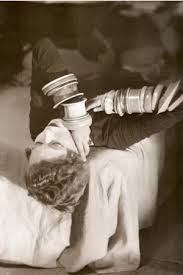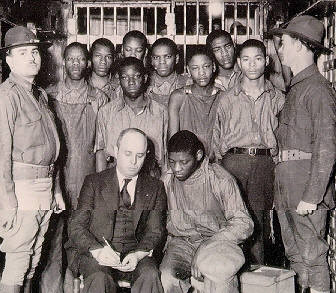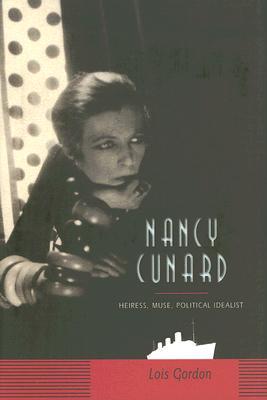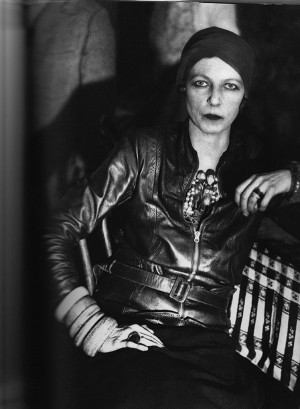Authors Take Sides
1January 26, 2014 by Lydia Syson

Who is this glorious woman?
If you saw the recent production of The Scottsboro Boys at the Young Vic in London you’ll be interested in her involvement in the campaigns on both sides of the Atlantic to free these nine young black men falsely charged with raping two white women on a freight train in Alabama in 1931. The dazzlingly beautiful, taboo-breaking daughter of a British shipping magnate, Nancy Cunard started her career as a journalist with the Associated Negro Press (ANP), but she was also a poet, political activist and a publisher. Charismatic and idealistic, she clearly had a genius for motivating the radical intellectual circles, black and white, in which she largely moved.
Her mother – a close friend of Oswald Mosley – disinherited her fairly speedily in 1931. Over the next few years Nancy Cunard took part in the hunger marches in Britain, raised funds and agitated on behalf of the Scotsboro Boys, published a ground-breaking anthology of essays on black history (Negro ,1934), founded the publishing house which first took on Samuel Beckett, and reported on the Ethiopian crisis for the ANP alongside fellow journalists Langston Hughes, Paul Robeson and Richard Wright.
Unsurprisingly, as soon as the Spanish Civil War broke out, Nancy Cunard headed for Barcelona. ‘Spain took hold of me entirely’ she wrote later. According to her biographer Lois Gordon, Spain was her greatest cause: she ‘went to the fronts to write eyewitness reports, help carry the wounded to safety, and feed the hungry; after Franco’s victory, now the Manchester Guardian’s sole eyewitness reporter, she walked with the refugees as they trudged to Perpignan and to their “holding centres” – really French concentration camps. With Hitler’s planes bombing everyone on the road, Nancy became accustomed to running for her life….Nancy remained a one-person army for years to come.’ [Interview with Gordon, author of Nancy Cunard: Heiress, Muse, and Political Idealist, 2007]
In Madrid, at the house of Pablo Neruda, Cunard met Spanish Republican writers such as Rafael Alberti, Federico Garcia Lorca and Miguel Hernandez, and it was Neruda who encouraged the campaigner in her plan to publish the pamphlet series The Poets of the World Defend the Spanish People, with poems in English, Spanish and French, including Auden’s controversial ‘Spain’. This led to a new project, Authors Take Sides on the Spanish War (London: Left Review, 1937), for which she sent a questionnaire to the poets of the British Isles, canvassing their opinions on the war, and the policy of non-intervention.
‘Are you for, or against, the legal Government and the People of Republican Spain? Are you for, or against, Franco and Fascism?
For it is impossible any longer to take no side.’
You can read the entire publication here, and it’s well worth it. The difference in tone between the responses, for example, of Marcus Garvey and Geoffrey Grigson, is fascinating. One makes reference to ‘the cult of organised murder’, the other to ‘potted shrimps in the club…reading the Manchester Guardian…holding hands in the cinema.’ You’ll also find what Eric Linklater of Emil and the Detectives fame had to say on the subject, as well as the words of two other writers who had a big influence on me in my youth, Antonia White (Frost in May) and Rosamund Lehmann (Invitation to the Waltz).
I also thoroughly recommend this article by Eric Hobsbawm on the subject, written for The Guardian in 2007. ‘Of the British writers asked, five (Waugh, Eleanor Smith and Edmund Blunden among them) favoured the Nationalists, 16 were neutral (including Eliot, Charles Morgan, Pound, Alec Waugh, Sean O’Faolain, HG Wells and Vita Sackville-West) and 106 were for the republic, many of them passionately…Writers supported Spain not only with money, speech and signatures, but they wrote about it, as Hemingway, Malraux, Bernanos and virtually all the notable contemporary young British poets – Auden, Spender, Day Lewis, MacNeice – did. Spain was the experience that was central to their lives between 1936 and 1939, even if they later kept it out of sight.’
It took decades to shake off the British notion of the Spanish Civil War as solely a poets’ war, and recognise the fact that the vast majority of International Brigade volunteers came from very ordinary, working-class backgrounds. Artists and writers are back in the foreground this year at the International Brigade Memorial Trust’s annual Len Crome ‘Lecture’ on March 1st at the Manchester Conference Centre: Taking Sides: Artists and Writers in the Spanish Civil War. The programme is extremely promising, with contributions from Jane Rogoyska on the photographers Gerda Taro and Robert Capa, Paul Preston talking about foreign correspondents, Carmen Herrero discussing the representation of the International Brigades in Spanish Cinema and Carl-Henryk Bjerstrom presenting his research on arts and education in Republican Spain. I’m very much looking forward to it.
Category News | Tags: ANP, Auden, Authors Take Sides, Eric Hobsbawm, Geoffrey Grigson, Len Crome Lecture, Lois Gordon, Marcus Garvey, Nancy Cunard, Negro, Pablo Neruda, Poets of the World, poets war, Scottsboro Boys





[…] a committed anti-fascist, something which sat poorly with some in her own family. As Lydia Syson has noted, “her mother – a close friend of Oswald Mosley – disinherited her fairly speedily in […]